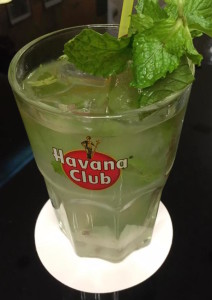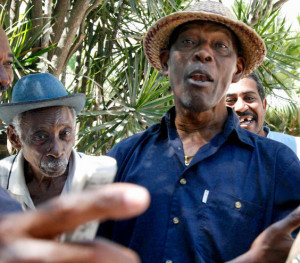 If you are a Facebook friend, you have seen the photos I was tagged in from Cuba.
If you are a Facebook friend, you have seen the photos I was tagged in from Cuba.
It was a LEGAL trip! Really!
There were many mojitos, and some classic car rides throughout, but our recent trip to Havana was on the up and up. Every day of our adventure had an educational purpose, something quite easy to accomplish for any US citizen in Cuba.
When you first arrive to Cuba, you realize that the 57 year stand-off* between our governments has left you almost entirely in the dark about this island country. All you know is “Bay of Pigs” and “Communism”. If you are left-leaning like me, you may also know some great quotes by Che Guevara, and the statistics on literacy rates in Cuba. Yes, the cigars, too.
Our trip was a non-credit bearing course. Each adult student had a topic they would research through conversations with locals. The topics were diverse and interesting: the health care system, the legal system, environmental concerns and pollution, plumbing practices and supplies, baseball, the Santería religion, the multiple currencies and economies (with great euphemisms like “parallel economies” and “the pink market”), as well as every day life for the typical Cuban citizen. Our classroom was the streets of Havana, where it was possible to strike up a conversation with just about anyone.
In addition, since we know so little about the reality of life in Cuba in 2016, every step down the street is a lesson. Old Havana is spruced up for the tourists, and as we learned, whenever a dignitary comes to visit, the road their motorcade will use is hastily paved and houses painted. Go one block off that paved road, and you will find pot holes older than me. Go one block off the beaten path and you discover beautiful colonial homes, one after another, most often in tremendous states of disrepair and decay. It is easy to imagine the grandeur of the city in its hey day. It is distressing to realize people are living in those homes that our municipal governments would certainly condemn and deny access to, so as to ensure the safety of the inhabitants.
In stark contrast to the city’s clear lack of infrastructure are the people you meet. This is a people that could or should hate us and our country for blocking them from access to goods and trade, and now, technology for almost six decades. Think that is a leftist way of viewing the situation? Read up on the Helms Burton Act (click here and here) or the Torricelli Act (click here and here). When things got rough in Cuba, we chose to tighten the noose, instead of using diplomacy to crack the “stand-off”. We thought we could foster revolution by denying food and medicine. Go figure.

Talk baseball any and every day at the “hot corner” in the Parque Central. Be sure you are up to date on your baseball stats!
In spite of all that, Cubans are delighted to meet US citizens. They cannot wait to engage you, ask you questions, talk politics and baseball. One local asked us if it was really true that our rights as individuals were protected in the US. The concept to him was completely unimaginable. Another asked us what most US citizens know about Cuba. We had to admit: “Very little.” Even the still-staunch believers in the Revolution and the Castro brothers like to discuss politics, in particular with US citizens.
This was my third educational trip to Cuba. (= All legal!)
Truth? This island country still manages to confound me, enchant me, and provide so many opportunities to learn. It is an assault on your senses and your sense of what you might know and believe. Beauty and kindness abound, in a setting of decay and need. Patience and resilience are characteristics required for survival.
And then the day ends with the perfect mojito, with Cuban music in the background. Son y ron. Complicated but perfect.
* The Cubans call the 57 year “stand-off” a “blockade”, rightly so in my mind.
 Sauced In New York Sometimes the food is in the sauce, sometimes we are
Sauced In New York Sometimes the food is in the sauce, sometimes we are






Beautiful Claire. Well said. Wish I was with you guys…!
Sounds like an awesome trip!
I never thought about how little we, as Americans, really know about Cuba until I read your article. I studied the country a little in a Latin American history class and there is the part in “Mountains Beyond Mountains” where Paul Farmer visits Cuba that opened my eyes a bit, but for a country that isn’t very far from our shores, it is so unknown to us. How wonderful that you were able to do this trip – the streets of a city as the classroom, it’s citizens your teachers. Beautifully written!
I am reminded of a gentleman we met on the street who had a tattoo on each arm. The first said “Only the strong survive,” the second said “All is not as it seems.” Very emblematic of Cuba! LOVED THE TRIP!!!